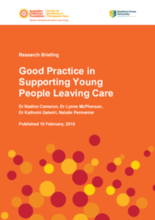Displaying 501 - 510 of 1482
This book explores how humanitarian interventions for children in difficult circumstances engage in affective commodification of disadvantaged childhoods.
The aim of this study is to explore whether girls who are in residential care have fewer emotional skills than their peers, and if so, whether these girls have similar socio-emotional skills to girls who also experience disadvantaged environments but live with their families.
This research summary provides an overview of what young people leaving residential care in Australia need and how those working in residential care can best help young people prepare for independence.
The aim of this study was to analyse subjectisuppleve well-being (SWB) among adolescents in care, considering the type of placement in greater depth and how it correlated with several explanatory variables.
The purpose of the study presented in this open access article was to provide an overview of the literature on associations between determinants and social climate and between social climate and outcomes in therapeutic residential youth care (TRC).
In Wales, a significant body of work has been produced on and with care-experienced children and young people. This edited collection attempts to highlight these valuable insights in a single volume.
This study focuses on life satisfaction among care leavers four years after leaving care in Israel.
This study highlights the plight of children in state orphanages during conditions of war and its aftermath, in order to explore how state narratives trap children between contested notions of the best interests of the child, national belonging, and familial rights.
The Transitioning to Family Care for Children Online Training provides an overview of the key concepts and steps that are important to a successful transition process.
The current study compared behavioral and adrenocortical functioning of maltreated and comparably aged (1.5–3 years) institutionally-reared children soon after (1.5–2.5 months) placement in foster care or adoptive homes, respectively.

